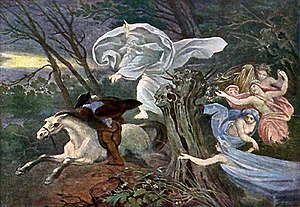The Erl King
 | |
| Original Title: | Erlkönig |
|---|---|
| Written by: | Johann Wolfgang von Goethe |
| Central Theme: | |
| Synopsis: | |
| First published: | 1782 |
"The Erl-King" or "The Alder King" ("Erlkönig" in German) is a German ballad written by Johann Wolfgang von Goethe in 1782.
It tells the story of a father who is carrying his sick son, while riding homewards after dark on horseback. The son is convinced that they are being pursued by the Erl-King, who speaks to him to persuade him to come away with him, while the father insists that the Erl-King doesn't exist -- what he sees, so he tells the boy, are only trees, bushes and fog. Yet the boy will not be calmed, finally screaming that Erl-King is touching him. Even the father is horrified now, and rides the horse as fast as possible. When he arrives, he realizes that the boy is dead.
The poem was inspired by a Danish folk tale, which was translated to German as "Erlkönigs Tochter" ("Daughter of the Arlen King"). However Erlkönig is a mistranslation of the Danish "ellerkonge", which actually means "King of the elves" (that would be "Elfenkönig" in German, in case you wondered). It is possible that Goethe went with the "wrong" translation consciously, as the Erl-King does not fit in with what most people of the era would have recognized as an Elf-King; in the ballad, he seems to serve as a substitute to the Grim Reaper or Death. The "rational" interpretation is that the boy is hallucinating from fever.
"Erlkönig" is one the most recognizable of Goethe's works for Germans, thanks to its time-honored status as an inevitable school study medium.
The poem was set to music (for solo voice and piano) by Franz Schubert in 1815.
For a literal translation of the ballad, visit the synopsis page. A rhyming translation (as "The Alder King") can be found on Wikisource.
- Downer Ending
- Chase Scene
- The Fair Folk
- Having a Gay Old Time / Alternate Character Interpretation: Some of the lines ("Ich liebe dich, mich reizt deine schöne Gestalt" -> "I love you, your beautiful form tempts/attracts/entices me") make the Erlkönig seem more like a creepy pedophile for modern readers. However, during Goethe`s lifetime most of these expressions did not have the sexual undertones they have today.
- Maybe Magic, Maybe Mundane: The poem does not answer the question whether the Erl-King is real or the boy`s fever dream. Goethe himself however did believe in preternatural beings.
- Not-So-Imaginary Friend: Inverted -- not so Imaginary Enemy.